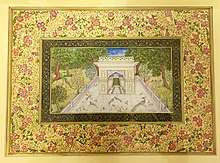Abdul-Qādir Bedil
Mawlānā Abul-Ma'ānī Mīrzā Abdul-Qādir Bēdil (or Bīdel), also known as Bīdel Dehlavī (1642–1720), was a Sufi saint and a remarkable poet from the Indian subcontinent. He was the foremost representative of the later phase of the "Indian style" (sabk-e hendī) of Persian poetry and the most difficult and challenging poet of that school. He is considered the most difficult and challenging poet of Safavid-Mughal poetry.[1]

Works
Even though he is known as a master of Persian poetry, Bīdel was actually of Turkic Central Asian descent, his family originally belonging to the Arlās tribe of the Chaghatay,[1] regarded by some as part of the Uzbek people.[2][3][4][5][1] He was born in Azīmābād, present-day Patna in India.
Bīdel mostly wrote Ghazal and Rubayee (quatrain) in Persian, the language of the Royal Court, which he had learned since childhood.[1] He is the author of 16 books of poetry, which contain nearly 147,000 verses and include several masnavi) in that language.[6] He is considered as one of the prominent poets of Indian School of Poetry in Persian literature, and owns his unique Style in it. Both Mirza Ghalib and Iqbal-i Lahori were influenced by him. His books include Tilism-i Hairat (طلسم حيرت), Tur i Ma'rifat (طور معرفت), Chahār Unsur (چهار عنصر) and Ruqa'āt (رقعات).
Possibly as a result of being brought up in such a mixed religious environment, Bīdel had considerably more tolerant views than his poetic contemporaries. He preferred freethought to accepting the established beliefs of his time, siding with the common people and rejecting the clergy who he often saw as corrupt.
Bīdel is much welcomed in Afghanistan, Tajikistan and Pakistan. Bīdel came back to prominence in Iran in 1980s. Literary critics Mohammad-Reza Shafiei-Kadkani and Shams Langrudi were instrumental in Bīdel's re-emergence in Iran. Iran also sponsored two international conferences on Bīdel.[7]
The Indian school of Persian poetry and especially Bīdel's poetry is criticized for its complex and implicit meanings, however, it is much welcomed in Afghanistan, Tajikistan, Pakistan and India than in Iran.[8] The main reason could be his style which is kept a bit Indian. In Afghanistan, a unique school in poetry studying is dedicated to Bīdel's poetry called Bīdelšināsī (Bīdel studies) and those who have studied his poetry are called Bīdelšinās (Bīdel expert). His poetry plays a major role in Indo-Persian classical music of central Asia as well. Many Afghan classical musicians, e.g. Mohammad Hussain Sarahang, have sung plenty of Bīdel's ghazals.
Grave
His grave, called Bāġ-e Bīdel (Garden of Bīdel) is situated across Purana Qila, at Mathura Road next to the Major Dhyan Chand National Stadium gates and the pedestrian bridge over Mathura Road in Delhi.[9]
Notes
- M. Sidiqqi: Abdul-Qādir Bīdel. Encyclopaedia Iranica. 1989. Vol. IV, Fasc. 3, pp. 244-246
- Бедиль Мирза Абдулкадир Archived 22 October 2014 at the Wayback Machine
- Allworth Edward, The modern Uzbeks from the fourteenth century to the present: a cultural history, Hoover Press, 1990, p.74. "His family in Putna (Azimabad) was descended from Uzbeks who had evidently migrated to Hindustan much earlier."
- Enzyclopedia Britannica: South Asian arts. "The greatest poet of the Indian style, however, was ʿAbdul Qādir Bēdil, born in 1644 in Patna, of Uzbek descent."
- Mirza Abdul-Qader Bedil biography and peoetry Archived 26 December 2014 at the Wayback Machine
- "Arts, South Asian." Encyclopædia Britannica from Encyclopædia Britannica 2007 Ultimate Reference Suite. (2008).
- International Seminar on Mirza Bedil, March 2003, Tehran, LINK Archived 28 September 2007 at the Wayback Machine
- Mehrnews.com, Reasons for Bedil's unfamiliarity in Iran, Tehran 1385, LINK
- "In the lanes of Zauq and Ghalib". Indian Express. 15 March 2009. Archived from the original on 21 January 2012.
References
- Erkinov A. "Manuscripts of the works by classical Persian authors (Hāfiz, Jāmī, Bīdil): Quantitative Analysis of 17th-19th c. Central Asian Copies". Iran: Questions et connaissances. Actes du IVe Congrès Européen des études iraniennes organisé par la Societas Iranologica Europaea, Paris, 6-10 Septembre 1999. vol. II: Périodes médiévale et moderne. [Cahiers de Studia Iranica. 26], M.Szuppe (ed.). Association pour l'avancement des études iraniennes-Peeters Press. Paris-Leiden, 2002, pp. 213–228.
- Gould R. "Bīdel," Encyclopedia of Indian Religions. Ed. Arvind Sharma.. New York: Springer, 2013.
- R. M. Chopra, "Great Poets of Classical Persian", Sparrow Publication, Kolkata, 2014, (ISBN 978-81-89140-75-5)
External links
| Wikiquote has quotations related to: Abdul-Qādir Bedil |
- Collection of all works of Mirza Abdul Qadir Bedil.
- internationaler Kongreß auf Bidel Dehlavi (Tehran 2006) (BBC Persian)
- ابوالمعالی بیدل A brief Article in Urdu
- collected poetry of Bīdel in scanned authentic version uploaded by Javed Hussen
- Poems of Bīdel (Persian)
- Some of Bedil's eclectic lines and quatrains.